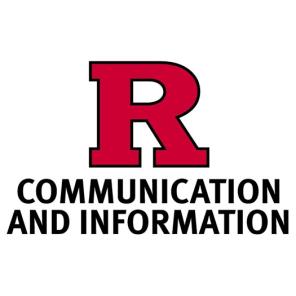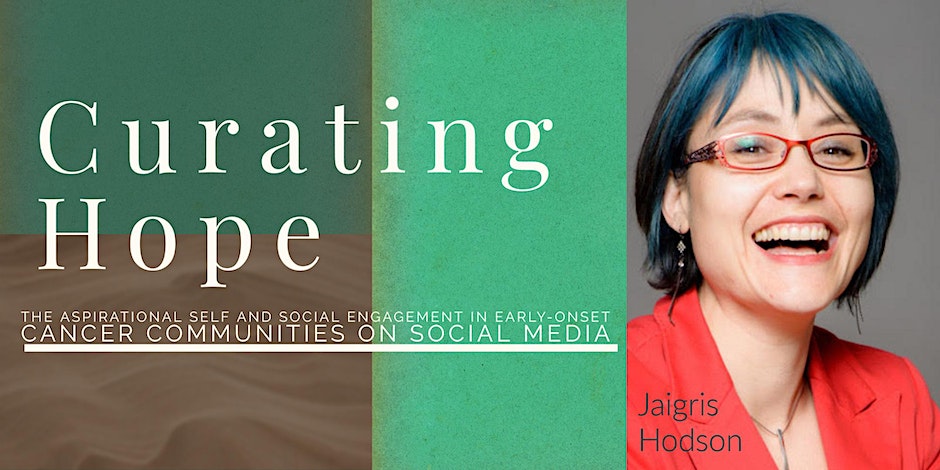April 21, Curating Hope: Early-Onset Cancer Communities on Social Media

 Early-onset cancer patients and survivors have unique needs in comparison to their older counterparts and so often turn to social media to find others with similar experiences. This presentation reports on a study that used reflexive qualitative interviews to understand the unique needs of early-onset cancer patients and caregivers as they engage with digital communities related to their illness. Drawing from such theories as uses and gratifications, context collapse, and aspirational self-presentation, Hodson shows how people engaging with social media communities related to early-onset cancer employ “affordances-in-practice", choosing what to post based both on the technical affordances of each platform, and also based on the audience they imagine on each platform. Hodson’s research reveals that in addition to providing information and social support, participants in early-onset cancer communities use social media to seek hope. This finding in particular suggests a nuanced reconsideration of the existing dichotomy between online authenticity and the aspirational self on social media platforms like Instagram.
Early-onset cancer patients and survivors have unique needs in comparison to their older counterparts and so often turn to social media to find others with similar experiences. This presentation reports on a study that used reflexive qualitative interviews to understand the unique needs of early-onset cancer patients and caregivers as they engage with digital communities related to their illness. Drawing from such theories as uses and gratifications, context collapse, and aspirational self-presentation, Hodson shows how people engaging with social media communities related to early-onset cancer employ “affordances-in-practice", choosing what to post based both on the technical affordances of each platform, and also based on the audience they imagine on each platform. Hodson’s research reveals that in addition to providing information and social support, participants in early-onset cancer communities use social media to seek hope. This finding in particular suggests a nuanced reconsideration of the existing dichotomy between online authenticity and the aspirational self on social media platforms like Instagram.
This event will be moderated by Yonaira M. Rivera (Rutgers University), member of the DEWG steering committee.
Jaigris Hodson is the Canada Research Chair (tier 2) in Digital Communication for the Public Interest. Her SSHRC and CIHR funded research examines the ways that misinformation can be mitigated through digital communication efforts, particularly those targeted at the research community. Thus her current work examines such interdisciplinary topics as educational interventions to address COVID-19 related misinformation, the online harassment of diverse researchers, ecological approaches to understanding misinformation in a modern context, and the communication of health and science in a time of misinformation.
 Early-onset cancer patients and survivors have unique needs in comparison to their older counterparts and so often turn to social media to find others with similar experiences. This presentation reports on a study that used reflexive qualitative interviews to understand the unique needs of early-onset cancer patients and caregivers as they engage with digital communities related to their illness. Drawing from such theories as uses and gratifications, context collapse, and aspirational self-presentation, Hodson shows how people engaging with social media communities related to early-onset cancer employ “affordances-in-practice", choosing what to post based both on the technical affordances of each platform, and also based on the audience they imagine on each platform. Hodson’s research reveals that in addition to providing information and social support, participants in early-onset cancer communities use social media to seek hope. This finding in particular suggests a nuanced reconsideration of the existing dichotomy between online authenticity and the aspirational self on social media platforms like Instagram.
Early-onset cancer patients and survivors have unique needs in comparison to their older counterparts and so often turn to social media to find others with similar experiences. This presentation reports on a study that used reflexive qualitative interviews to understand the unique needs of early-onset cancer patients and caregivers as they engage with digital communities related to their illness. Drawing from such theories as uses and gratifications, context collapse, and aspirational self-presentation, Hodson shows how people engaging with social media communities related to early-onset cancer employ “affordances-in-practice", choosing what to post based both on the technical affordances of each platform, and also based on the audience they imagine on each platform. Hodson’s research reveals that in addition to providing information and social support, participants in early-onset cancer communities use social media to seek hope. This finding in particular suggests a nuanced reconsideration of the existing dichotomy between online authenticity and the aspirational self on social media platforms like Instagram.
This event will be moderated by Yonaira M. Rivera (Rutgers University), member of the DEWG steering committee.
Jaigris Hodson is the Canada Research Chair (tier 2) in Digital Communication for the Public Interest. Her SSHRC and CIHR funded research examines the ways that misinformation can be mitigated through digital communication efforts, particularly those targeted at the research community. Thus her current work examines such interdisciplinary topics as educational interventions to address COVID-19 related misinformation, the online harassment of diverse researchers, ecological approaches to understanding misinformation in a modern context, and the communication of health and science in a time of misinformation.
